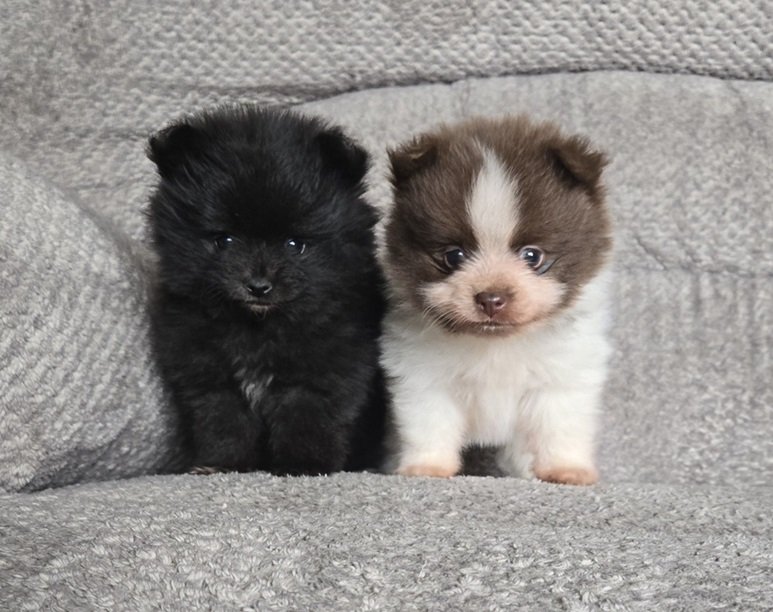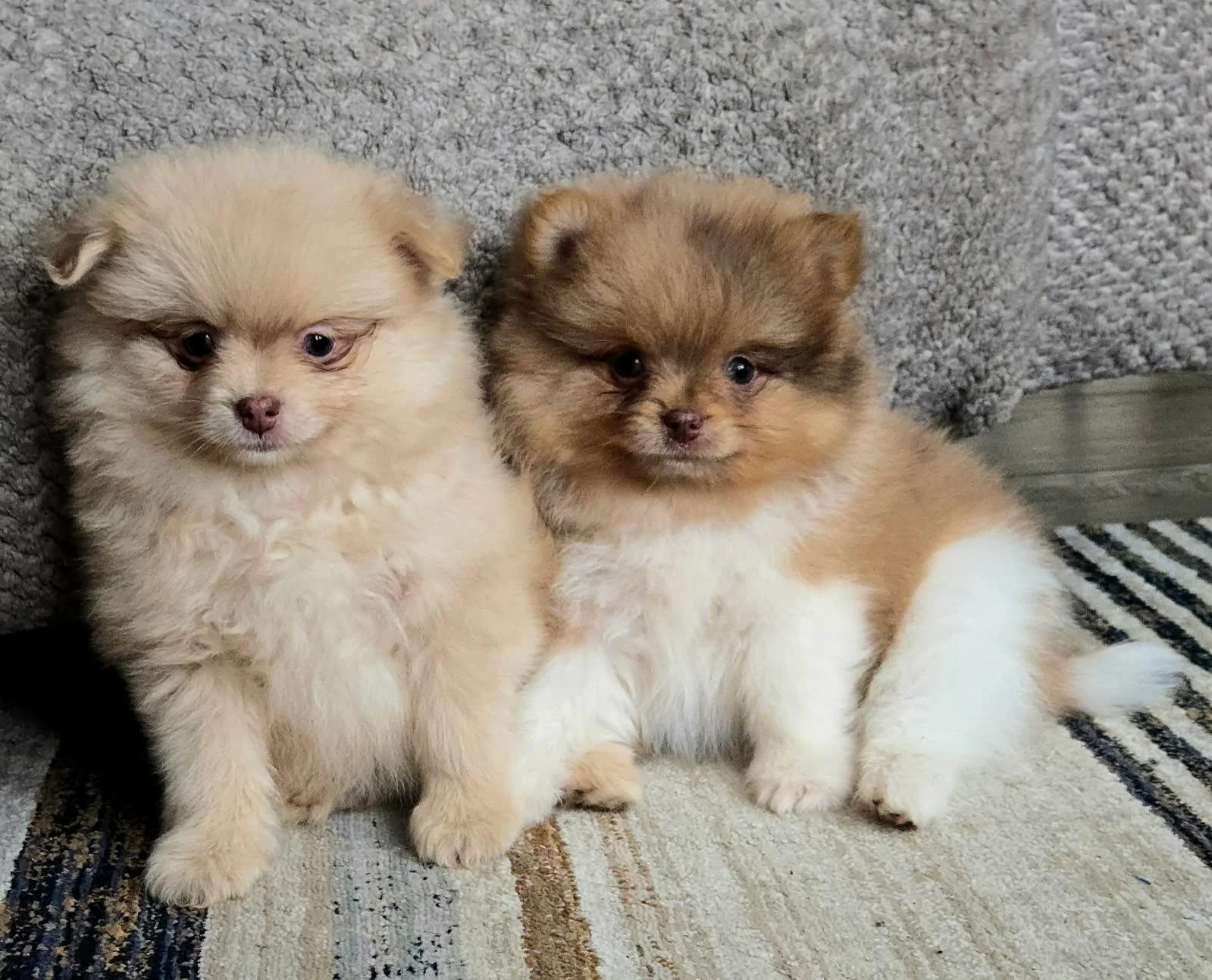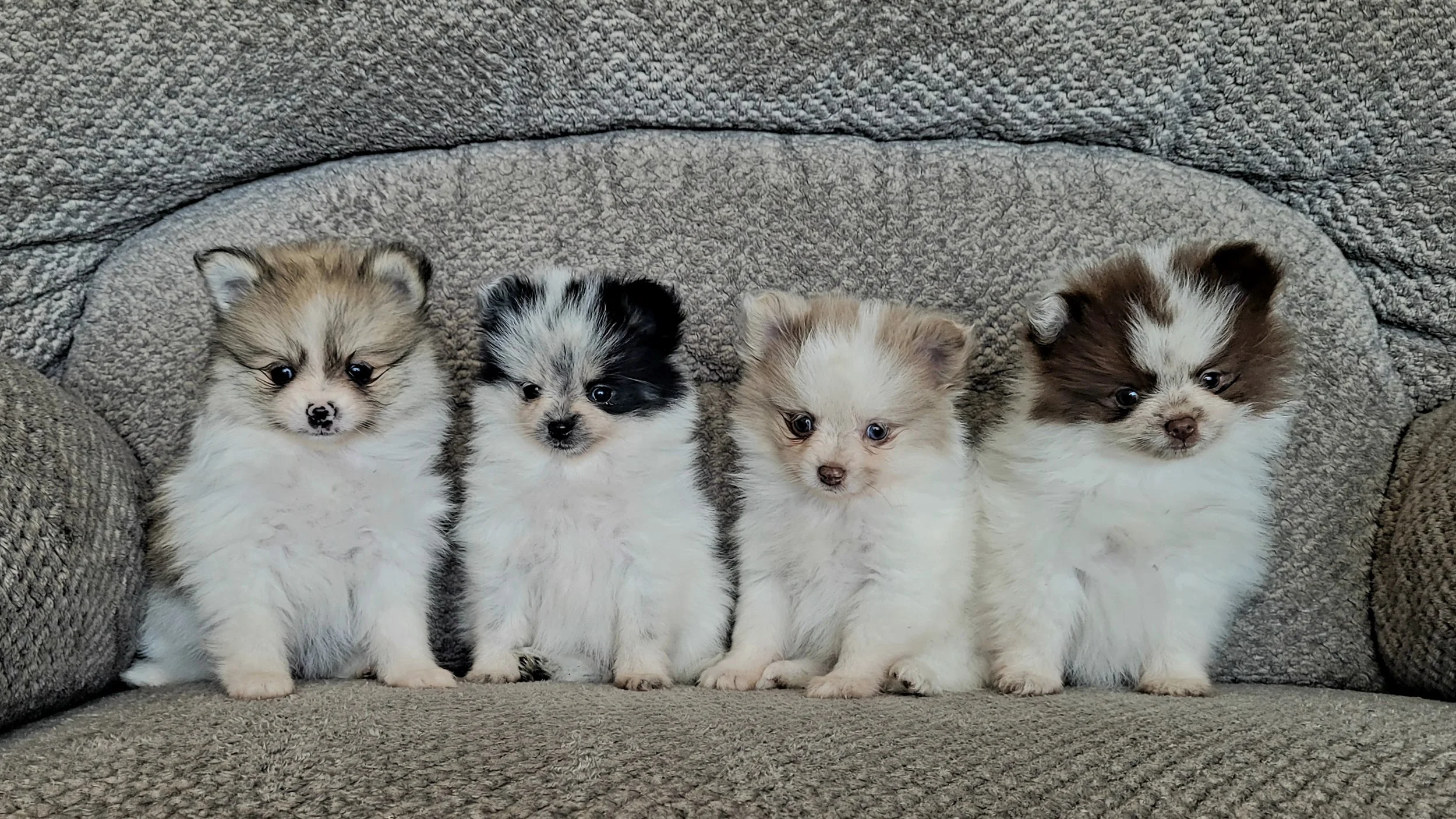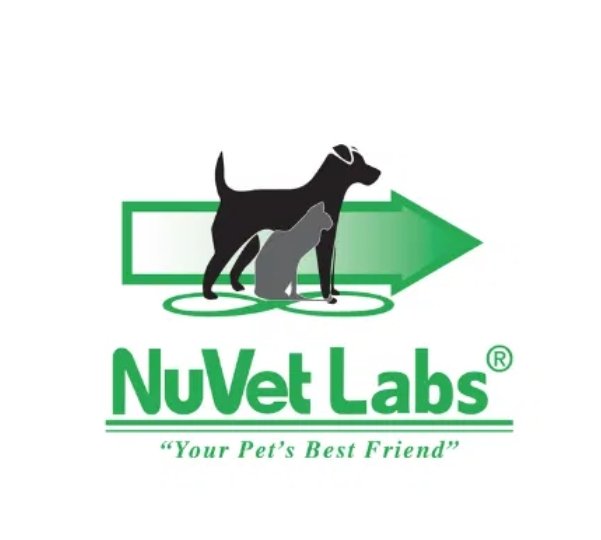Hello!
Our curious, healthy Pomeranian pups raised with family care. Litters bred and health-tested by experienced breeders. Focused on temperament, socialization, and quality. AKC-registered, vet-checked, vaccinated, microchipped, with health prioritized.
Pomeranians — Energetic, Affectionate, Intelligent, Loyal
Let’s get social!
Curious and purposeful, our YouTube and Facebook share bold ideas and real results—heartwarming puppy moments, new parent congratulations, and behind-the-scenes of our family-raised AKC Pomeranians. Follow and join our caring community.
Our Partners
Our Partners
NuVet Labs is dedicated to improving pet health through high-quality nutritional supplements. Their flagship product, NuVet Plus, is formulated with a blend of antioxidants, amino acids, vitamins, minerals, and enzymes to support dogs' immune systems and overall well-being. Made with natural ingredients in an FDA-registered facility, NuVet supplements are trusted by veterinarians, breeders, and pet owners alike. 🐶
NuVet Labs
AKC
Our dogs are registered with the American Kennel Club to ensure their pure lineage.
Embark Veterinary
Embark is a leading provider of dog DNA testing, offering comprehensive insights into breed identification, health risks, and genetic traits. Their tests analyze over 350 breeds and screen for 200+ genetic health conditions, helping pet owners make informed decisions about their dogs' care.
Breed information
-
Pomeranians are known for their vibrant and lively temperament, often characterized as friendly, intelligent, and curious. These small dogs are typically affectionate and enjoy interacting with their human companions, making them excellent family pets. They tend to form strong bonds with their owners and may exhibit a protective nature, which can manifest as alertness to strangers or unusual sounds in their environment.
We believe strongly that socialization plays a crucial role in shaping a Pomeranian's temperament. Despite their small size, Pomeranians have a confident demeanor and often display a spirited personality, which may lead them to believe they can take on much larger dogs.
-
Pomeranians have a striking appearance, characterized by a fluffy double coat, a compact and sturdy body, and a fox-like face. Their fur can come in a variety of colors, including orange, black, cream, blue, and sable, among others. Each Pomeranian's coat may present different markings, adding to their uniqueness.
These small dogs typically weigh between 5 to 12 pounds and stand about 12 to 20 inches tall at the shoulder. Their delightful personalities are often reflected in their expressive eyes and cheerful demeanor. Pomeranians have a signature ruff of fur around their neck, resembling a mane. This feature, combined with their tiny, pointed ears and lively personality make the perfect pet for your home!
-
Pomeranian puppies are known for their exuberant energy and playful nature. They are highly active and curious, exploring their surroundings with enthusiasm. During their early months, they engage in frequent bursts of play, often alternating between running, jumping, and engaging in various forms of social interaction. This high energy level is crucial for their physical and cognitive development. Puppies require multiple play sessions throughout the day, along with socialization activities to help them develop healthy behavior patterns, balanced with frequent naps to ensure their wellbeing.
As Pomeranians transition into adulthood, their activity levels begin to stabilize. While they still maintain a playful demeanor, adult Pomeranians tend to exhibit a more measured approach to play and exercise. Their energy levels may decrease slightly, but they remain active and enjoy regular daily walks, playtime, and mental stimulation through interactive toys and training exercises.
The contrast between Pomeranian puppies and adults can be significant. Puppies require more frequent, intense play and socialization to expel their energy, while adult Pomeranians thrive on a structured routine that balances exercise, playtime, and rest. Both stages require adequate physical activity, but the focus shifts from high-energy play in puppies to consistent, moderate exercise in adults. Properly addressing the activity needs of both puppies and adults contributes to their overall health and happiness.
Pomeranian History Time!
The Pomeranian is a beloved toy breed known for its fluffy coat and vivacious personality. This pint-sized pup hails from the Pomerania region, which is located in the area of northern Poland and northeastern Germany. Despite its small stature, the Pomeranian is descended from larger sled-pulling Spitz breeds. Over time, through careful breeding and selection, the Pomeranian as we know it today was developed.
Originally, Pomeranians were working dogs, specifically bred for herding and guarding livestock. They were also favored by royals and aristocrats, particularly in the 18th century when they were popular in royal courts across Europe. The breed's size was gradually reduced through selective breeding, eventually leading to the miniature companion we know and love today.
In the 19th century, the Pomeranian gained popularity in England when Queen Victoria took a particular interest in the breed. Her love for Pomeranians helped propel their popularity, and the breed became a mainstay in high society.
Today, Pomeranians continue to be cherished as affectionate companions and show-stopping pets. Their origins as working dogs may be overshadowed by their role as delightful companions, but their intelligence, spirit, and distinct appearance are all testaments to their rich history.

FAQs
-
Housetraining a Pomeranian puppy requires patience, consistency, and positive reinforcement. Due to their small size, Pomeranian puppies have tiny bladders and may need to relieve themselves frequently. Establishing a regular schedule for potty breaks and crate training can greatly aid in the housetraining process. When accidents occur, it's essential to remain calm and avoid scolding the puppy, as this can cause anxiety and hinder progress. Instead, diligently praise and reward the puppy for eliminating in the appropriate spot. Supervision, confinement when unsupervised, and frequent trips outside are key elements in successfully housetraining a Pomeranian puppy.
-
Housetraining a Pomeranian can have its challenges, as with any dog breed. Pomeranians are known for their intelligence and independence, which can sometimes lead to stubbornness during the housetraining process. However, with patience, consistency, and positive reinforcement, housetraining a Pomeranian is very achievable. Pomeranians may need more frequent trips outside, especially as puppies. Setting a regular schedule for bathroom breaks and providing plenty of praise and rewards for good behavior can help in successfully housetraining a Pomeranian.
-
Crate training a Pomeranian puppy is an essential aspect of their early development and overall well-being. By introducing the puppy to a crate early on, you provide them with a safe and secure environment that becomes their own personal space. The crate serves as a den, where the puppy can retreat for comfort and relaxation. It also aids in housetraining, as Pomeranians will benefit from a structured routine. When done properly, crate training teaches the puppy to be independent, reduces anxiety, and prevents destructive behavior when unsupervised. It's crucial to make the crate a positive and comfortable space, with cozy bedding and toys, and to never use it for punishment. Gradually increasing the time spent in the crate and using positive reinforcement will help the Pomeranian puppy view it as a safe haven.
-
Puppy pad training your Pomeranian can be an effective method, especially if you live in an apartment or have limited outdoor access. Start by placing the puppy pads in a designated area of your home, preferably near the door. When you notice your Pomeranian showing signs that they need to relieve themselves, such as sniffing around or circling, gently guide them to the puppy pad. Use positive reinforcement, such as treats and praise, when they use the pad correctly. It's important to be consistent and patient during this process, as it may take time for your Pomeranian to fully grasp the concept. With consistent training and positive reinforcement, your Pomeranian can learn to use puppy pads effectively, providing a convenient potty solution for both you and your adorable fur baby.
-
Obedience training is essential for your Pomeranian's well-being and safety. Teaching your Pomeranian basic commands such as sit, stay, and come, not only helps establish your leadership but also ensures they are well-behaved and manageable in various situations. Since Pomeranians are intelligent and eager to please, they generally respond well to obedience training. Consistency, positive reinforcement, and patience are key when training your Pomeranian. Using treats, praise, and short frequent training sessions can help keep your Pomeranian engaged and motivated. With proper obedience training, your puppy will become a well-mannered and delightful companion.
-
Leaving your Pomeranian puppy alone for any length of time can be a difficult decision for many pet owners. Pomeranians are known for their affectionate and social nature, and they can have a hard time being apart from their human family members. When leaving your Pomeranian puppy alone, it's important to ensure that they have a safe and comfortable environment with plenty of toys and stimulating activities to keep them occupied. Gradually acclimating them to being alone for short periods of time and providing positive reinforcement can help them feel more at ease when left alone. Additionally, making sure they have access to food, water, and a designated bathroom area is essential for their well-being. If extended periods of alone time are unavoidable, considering a pet sitter or doggy daycare can provide the companionship and attention that Pomeranians thrive on.
-
Pomeranians are known for their lively and alert nature, which can often result in frequent barking. As a breed, Pomeranians tend to be vocal and expressive, using barking as a way to communicate and express their emotions. Their small size also contributes to their tendency to bark, as they may be more inclined to vocalize in order to assert themselves or ward off perceived threats. However, with proper training and socialization, Pomeranians can learn to moderate their barking behavior. It's important for Pomeranian owners to provide consistent training and positive reinforcement to help their pets learn when it's appropriate to bark and when to be quiet.
-
Training a Pomeranian not to bark excessively requires patience and consistency. Start by addressing the underlying reasons for the barking, which could include boredom, anxiety, or territorial behavior. Engage the dog in regular exercise and mental stimulation to help alleviate excess energy and reduce stress. Use positive reinforcement techniques, such as treats and praise, to reward moments of quiet behavior and redirect attention away from triggers of barking. Additionally, desensitization to common triggers like doorbells or other dogs passing by can help diminish the impulse to bark. Utilizing commands like "quiet" or "enough" paired with consistent training sessions will encourage your puppy to control their barking tendencies. Remember to remain calm and patient throughout the training process, as Pomeranian puppies respond best to gentle guidance and encouragement.
-
Training your Pomeranian puppy to refrain from chewing on household items such as shoes, furniture and clothing, requires patience and consistency. Start by providing your puppy with plenty of appropriate chew toys to redirect their chewing behavior. Whenever you catch your puppy chewing on something they shouldn't, firmly say "no" and take the item away, replacing it with one of their toys. Positive reinforcement is crucial, so be sure to praise and reward your puppy when they chew on their toys instead. It's important to puppy-proof your home by keeping tempting items out of reach, and consider using bitter-tasting sprays on furniture legs or other objects to deter chewing. With time and reinforcement, your Pomeranian puppy will learn what is acceptable to chew on and what is not.
-
Grooming your Pomeranian is an essential part of keeping your furry friend healthy and looking their best. Start by brushing your Pomeranian's double coat regularly to prevent matting and reduce shedding. Use a slicker brush or metal comb to gently remove tangles and loose fur. Pay close attention to the areas behind the ears, on the chest, and around the hind legs. Additionally, trim your Pomeranian's nails every few weeks to prevent them from becoming too long and causing discomfort. Be sure to use proper pet nail clippers and avoid cutting into the quick. Finally, bathe your Pomeranian every 1-2 months using a gentle dog shampoo to keep their coat clean and fresh. Remember to dry them thoroughly and gently brush out any tangles after each bath. Regular grooming not only keeps your Pomeranian looking adorable but also contributes to their overall well-being.
-
To comb your Pomeranian, start by choosing a high-quality comb with wide-set, rounded metal teeth to avoid scratching your pup's sensitive skin. Begin at the rear of your Pomeranian and gently work your way forward, combing through the dense double coat to remove any tangles or mats. Pay special attention to areas prone to matting such as behind the ears, under the legs, and around the neck. Be gentle and patient, as Pomeranians have a thick and luxurious coat that requires regular maintenance. By combing your Pomeranian regularly, you can keep their coat healthy, shiny, and free from painful tangles. Remember to offer lots of praise and treats to make the grooming experience positive for your furry friend.
-
Pomeranians are energetic and lively little dogs that benefit greatly from daily walks. Due to their small size, they don't need long walks but do require regular short walks to expend their energy and maintain their overall health. These walks provide them with mental stimulation, help to prevent behavior issues, and keep them physically fit. It's important to remember that Pomeranians are prone to overexertion, especially in hot weather, so it's essential to adjust the length and intensity of their walks according to their individual needs. Additionally, incorporating playtime and interactive activities during walks can ensure they receive the exercise and stimulation necessary to keep them happy and content.
-
Pomeranians are known for their lively and spirited nature, and while they are generally affectionate and friendly, some individuals can display signs of having a temper. Pomeranians are known to be assertive and confident little dogs, and their strong-willed personalities can sometimes lead to instances of stubbornness or even displays of aggression, especially if they feel threatened or if their boundaries are being challenged. It's important to note that a Pomeranian's temperament can be influenced by various factors, including genetics, socialization, and training. With proper care, positive reinforcement, and early socialization, Pomeranians can develop into well-adjusted and well-behaved companions.
-
Pomeranian puppies shed due to their double coat, featuring a soft undercoat and longer guard hairs. Shedding is more noticeable in spring and fall when they blow their coat. Regular grooming, like brushing several times a week or more during shedding seasons, helps manage loose hair. Despite shedding, many owners feel the joy of having a Pomeranian outweighs the grooming and cleaning needed.
-
Pomeranians are generally not hard to maintain, but they do require regular grooming and attention. Their luxurious double coat needs to be brushed several times a week to prevent tangles and mats, and they also shed quite a bit. Additionally, their small size means they need to be handled carefully and protected from potential injuries. Pomeranians are energetic and intelligent dogs, so they also require mental stimulation and daily exercise to prevent boredom and destructive behaviors. Overall, while Pomeranians may require some extra care compared to other breeds, their loving and affectionate nature makes the effort well worth it.
-
Pomeranians make exceptional house dogs due to their small size, making them well-suited for apartment living or smaller homes. Their affectionate and loyal nature contributes to their reputation as excellent companions, always ready to provide comfort and love to their owners. Despite their small stature, Pomeranians are known for their alertness and will readily alert their owners to any potential intruders or unusual activity. Their intelligence and eagerness to please also make them relatively easy to train, which is advantageous for maintaining a well-behaved pet in a household setting. Additionally, their minimal exercise requirements and tendency to adapt well to indoor living further solidify their status as fantastic house dogs.
-
A good quality Pomeranian from a reputable breeder can typically cost anywhere from $900 to $5,000, with some exceptional specimens fetching even higher prices. Various factors contribute to the cost, including bloodline, pedigree, coat color, and physical conformation. Ethical breeders invest in health testing, proper care, socialization, and quality nutrition, which all contribute to the overall cost of the puppy. It's essential for potential Pomeranian owners to consider the long-term investment of a healthy and well-bred puppy, as this contributes to a lifetime of companionship and joy.
-
Pomeranians are known for their affectionate and loyal nature, and they often form strong bonds with their owners. While they may show love and affection to everyone in the household, Pomeranians often do pick one person as their favorite. This person is usually the one who spends the most time with the dog, provides care and attention, and establishes a strong emotional connection. Once a Pomeranian selects their special person, they tend to become incredibly devoted, seeking out their attention and companionship. It's important for all family members to spend quality time with their Pomeranian to ensure a well-rounded and happy relationship for all.
-
Pomeranians, despite their small size and charming demeanor, can be frightened by various things. Loud noises such as thunderstorms, fireworks, or construction work can startle and distress them. Sudden movements or unfamiliar people and animals may also trigger fear in Pomeranians, causing them to bark or hide. Additionally, being left alone for extended periods can instill a sense of anxiety in these social creatures. It's essential for Pomeranian owners to provide a secure and comforting environment for their pets, along with positive reinforcement and reassurance to help them overcome their fears.
-
Pomeranians are generally good with other dogs, especially if they are socialized from a young age. Due to their small size, they may be cautious around larger dogs, but with proper introductions and positive experiences, they can get along well with dogs of all sizes. Pomeranians are known for their friendly and confident nature, which often helps them to establish good relationships with other dogs. However, it's essential to supervise interactions and provide training to ensure that they can coexist peacefully with other canine companions.
-
Pomeranians can swim, but it's essential to introduce them to water gradually and ensure they feel comfortable. Due to their small size and fluffy coats, some Pomeranians may not naturally take to swimming. It's crucial to supervise them closely around water, as they can tire quickly and may struggle to stay afloat. Using a doggie life jacket can provide extra safety and confidence for Pomeranians in the water. With patient training and encouragement, many Pomeranians can enjoy and become proficient swimmers, providing an excellent form of exercise and enrichment.
-
Pomeranians are adorable little pups who love to be close to their humans, so it's important to provide them with a comfortable and secure sleeping space. Many Pomeranian owners find that their pets enjoy sleeping in a cozy dog bed placed in their bedroom. This not only allows the dog to feel safe and secure but also strengthens the bond between the owner and the Pomeranian. Some Pomeranians may even prefer to sleep in a comfortable, enclosed crate, as it provides a den-like environment that appeals to their instinctual needs. Regardless of the chosen sleeping arrangement, ensuring that the space is warm, quiet, and free from drafts is essential for a good night's rest.
-
Pomeranians should be bathed every 4-6 weeks, unless they have gotten particularly dirty or smelly. Bathing them too frequently can strip their skin and coat of natural oils, leading to dryness and irritation. For routine maintenance, regular brushing and occasional spot cleaning with a damp cloth can help keep a Pomeranian fresh and clean between baths. It's also important to use a gentle, pet-friendly shampoo when bathing a Pomeranian to avoid irritation and maintain the natural balance of oils in their skin and coat.
-
Pomeranians are small dogs with luxurious double coats that provide excellent insulation, making them relatively resistant to cold temperatures. However, when it comes to sleeping at night, Pomeranians can still get chilly, especially if the room is drafty or the temperature drops significantly. It's important to provide them with a cozy and warm place to sleep, such as a soft bed with blankets to burrow into. Some Pomeranians may also appreciate wearing a comfortable sweater or pajamas to keep them extra warm during the night. Ensuring that the sleeping area is away from drafts and maintaining a comfortable room temperature can help Pomeranians have a restful and warm night's sleep.
-
Pomeranians are known for their affectionate nature, and their penchant for kissing is no exception. These delightful little dogs have a strong bond with their human companions and express their love through kisses. Pomeranians are social and thrive on close interaction with their owners, making kissing a natural way for them to show their affection and strengthen their connection. Their playful and loving demeanor prompts them to shower their loved ones with kisses as a way to communicate their adoration and build a strong emotional bond. Additionally, their small size and adorable appearance make them irresistible, encouraging owners to shower them with love and affection in return.
-
Pomeranians absolutely adore blankets! These fluffy little companions have a natural affinity for warmth and coziness, making blankets a favorite indulgence. Whether curling up for a nap or seeking comfort during chilly evenings, Pomeranians exhibit pure delight when snuggled up in a soft, inviting blanket. Their instinctual need for security and comfort is fulfilled by the presence of a cozy blanket, which often becomes their cherished spot for relaxation and contentment. From a practical standpoint, blankets also provide insulation for the Pomeranian's small frame, helping to regulate their body temperature. It's no wonder that these endearing bundles of fur wholeheartedly embrace the comfort and security that blankets offer.
-
Pomeranians do require regular grooming to keep their coat in top condition, but they don't necessarily need haircuts in the same way that some other breeds do. Their double coat consists of a soft, dense undercoat and a long, straight outer coat, which requires regular brushing to prevent mats and tangles. While occasional trimming may be necessary for hygiene or to neaten their appearance, it's essential to avoid excessive cutting as it can disrupt their coat's natural insulation and protection. Professional grooming for shaping or thinning out the coat may be sought, but it's important for owners to work with experienced groomers who understand the unique needs of Pomeranians to avoid any mishaps. Regular at-home grooming and occasional professional grooming will keep a Pomeranian's coat healthy and looking its best.
-
Pomeranians are a small breed with a thick double coat, which means they can be more susceptible to heat than some other breeds. Their fluffy fur is designed to keep them warm in colder climates, but it can also make them prone to overheating in hot weather. It's important for Pomeranian owners to be mindful of their pets' exposure to high temperatures and to take precautions to keep them cool and comfortable. This can include providing access to shade and water, avoiding strenuous exercise during the hottest parts of the day, and even considering a trim or haircut during the summer months to help them stay cool. Monitoring for signs of overheating, such as excessive panting, drooling, or lethargy, is crucial in ensuring the well-being of these beloved little dogs.
-
Feeding your Pomeranian peanut butter can be a delightful treat for your furry friend, but it should be done with caution. While peanut butter itself is not toxic to dogs, it is essential to ensure that the peanut butter does not contain xylitol, a common sweetener that is highly toxic to dogs. Additionally, peanut butter is high in fat and calories, so it should be given in moderation to prevent weight gain and digestive issues. When offering peanut butter to your Pomeranian, opt for unsalted, unsweetened varieties to minimize any potential health risks. As always, it's best to consult with your veterinarian before introducing any new food items into your Pomeranian's diet.
-
Pomeranians are known for their affectionate and playful nature, but what they love the most is undoubtedly attention from their human companions. These little furballs thrive on being the center of attention and love nothing more than snuggling up with their owners or being showered with praise and affection. Whether it's being cuddled on the couch, going for a walk, or simply being in the same room as their favorite humans, Pomeranians are happiest when they are receiving love and attention from those they adore. In return, they offer unwavering loyalty and endless affection, making them the perfect companions for those who are willing to dote on them.
-
When it comes to finding the best place to buy clothes for your beloved Pomeranian, there are a few important factors to consider. Firstly, comfort and quality are paramount, so it's essential to seek out retailers that specialize in pet apparel and prioritize durable materials and a comfortable fit. Additionally, considering the size and unique physique of Pomeranians, it's beneficial to shop at stores that offer a range of size options to ensure the perfect fit for your furry friend. Online pet boutiques and specialty pet stores are excellent options, as they often carry a wide variety of styles, sizes, and seasonal options to keep your Pomeranian both fashionable and cozy year-round. Lastly, seeking out stores with a track record of positive customer reviews and a reputation for excellent customer service can ensure a smooth and satisfying shopping experience for both you and your fluffy companion.
-
When deciding whether to get a boy or girl Pomeranian, it's essential to consider your personal preferences and specific needs. Both male and female Pomeranians make fantastic pets and can exhibit varying personality traits. Male Pomeranians are often more affectionate and eager to please, while females can be more independent and territorial. It's crucial to remember that individual personalities can deviate from these generalizations. Additionally, factors such as spaying and neutering can affect behavior and temperament. Ultimately, the decision between a boy or girl Pomeranian should be based on careful consideration of your lifestyle, expectations, and the compatibility of the dog with your family.
-
Feeding your Pomeranian at the table is generally not considered wise. While it may seem cute or convenient to share your food with your pup during mealtime, it can lead to bad habits and potential health issues. Pomeranians are prone to obesity, and feeding them from the table can contribute to overeating and weight gain. Additionally, it can encourage begging behavior and a sense of entitlement to human food, which can be disruptive and lead to digestive problems. It's important to establish boundaries and a consistent feeding routine for your Pomeranian to maintain their health and well-being.
-
Pomeranians are known for their intelligence and eagerness to please, which can make them quick learners when it comes to picking up their names. In general, a Pomeranian can learn its name within a few days to a couple of weeks with consistent and patient training. It's important to use positive reinforcement, such as treats and praise, to associate their name with something positive. Repetition and consistency are key in the training process, so incorporating their name into daily interaction and training sessions will help expedite the learning process. Every Pomeranian is unique, so while some may grasp their name quickly, others might take a bit more time to fully recognize and respond to it.
-
Pomeranians are generally affectionate and social dogs, so many of them do enjoy being cuddled by their owners. However, each Pomeranian has its own unique personality, so some may prefer cuddling more than others. It's important for owners to pay attention to their Pomeranian's body language and cues to understand if they are enjoying the cuddling or not. Some Pomeranians may prefer brief cuddle sessions while others may want longer periods of affection. Overall, with proper training and positive reinforcement, many Pomeranians can learn to enjoy and seek out cuddle time with their beloved owners.
-
Owning a Pomeranian comes with a unique set of pros and cons. On the positive side, Pomeranians are incredibly adorable and have a loving, playful, and affectionate nature. Their small size makes them well-suited for apartment living, and they are often eager to please, making them trainable and obedient. Additionally, Pomeranians are known for their alertness, making them excellent watchdogs despite their small stature. However, potential owners should also consider the cons of owning a Pomeranian. These fluffy companions have a tendency to bark a lot, which can be a challenge to manage. They also require regular grooming to maintain their fluffy coat, and they can be prone to certain health issues, particularly dental problems. Additionally, their lively temperament may not be suitable for families with very young children. Despite these considerations, Pomeranians bring an abundance of love, joy, and companionship to their owners' lives.
-
Pomeranians are known for their affectionate nature and love to be close to their owners. Many Pomeranians enjoy sleeping with their owners as it provides them with a sense of security and comfort. The warmth and companionship that they experience while sharing a bed with their owners can strengthen the bond between the pet and the owner. However, it's important to note that not all Pomeranians may enjoy sleeping with their owners, as some may prefer their own space. It's essential to consider the individual preferences of the dog and establish boundaries if needed to ensure a peaceful and restful sleep for both the Pomeranian and its owner.









